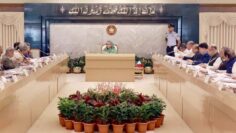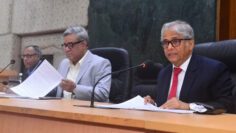Top Chinese nuclear scientist dies falling off building
In a post on Chinese social media platform Weibo, the university in the capital of Heilongjiang, China’s northernmost province, said police had ruled out homicide as the cause of death after on-site investigations, without providing further details.
“Harbin Engineering University announces with deep grief that Professor Zhang Zhijian regrettably fell off a building and died at 9:34am on June 17, 2021,” the statement said.
“The university expresses deep sorrow over the passing of comrade Zhang Zhijian and deep condolences to his family.”
There was no other official statement about Zhang’s death and his name remained on the leadership list of the university’s website on Friday.
Zhang was a professor at the college of nuclear science and technology at the university and the vice-president of the Chinese Nuclear Society. He was also a member of the standing committee of the Communist Party committee at the university.
In 2019, the researcher was awarded the Qian Sanqiang Technology Award, named after the father of China’s nuclear programme, by the state-owned China National Nuclear Corporation for his contribution to nuclear power simulation and safety research.
Last May, the scientist also received the National Award for Excellence in Innovation, an honour endorsed by the central government.
Born in 1963, Zhang was at least two years away from official retirement.
Two days before his death the university announced that Yin Jingwei, 41, the former dean of the college of underwater acoustic engineering, had been appointed as a new vice-president.
The university was one of the two Chinese universities
with close ties to the military that had been banned from using a US-developed computer software platform last June, amid tensions between China and the United States over technology.
The US Department of Commerce added the university and the Harbin Institute of Technology to its “entity list” a year ago.
The department said Harbin Engineering University had acquired and attempted to acquire “US-origin items in support of programmes for the People’s Liberation Army”.


![[ID: -kBGkIl6x-k] Youtube Automatic](https://www.pbc24.com/wp-content/uploads/2021/11/id-kbgkil6x-k-youtube-automatic-60x60.jpg)

















